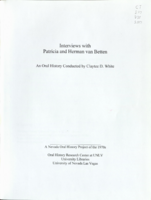Search the Special Collections and Archives Portal
Search Results

Transcript of interview with Sonja Saltman by Barbara Tabach, August 18, 2015
Date
Archival Collection
Description
Included in this oral history are reminiscences of Sonja Saltman's personal non-Jewish heritage in Austria, the importance of her grandmother in her life, and how she recalls becoming part of the Jewish community.
Sonja Saltman is a psychologist and philanthropist in Las Vegas, Nevada. She is executive director and co-founder of the Existential Humanistic Institute, a non-profit organization based in San Francisco, California that offers training in existential-humanistic therapy and theory. In 2003 Sonja and her husband Michael Saltman founded the Saltman Center for Conflict Resolution at the University of Nevada, Las Vegas (UNLV) William S. Boyd School of Law. The Saltman Center is focused on research, teaching, and public service related to "the advanced study of the nature of conflict and how to resolve it." A native of Austria, Sonja Saltman also serves as the Honorary Consul for Austria in Las Vegas. The Saltmans are involved with multiple charitable organizations and initiatives, both locally and abroad. Sonja Saltman has served on the boards of the Anti-Defamation League, Nevada Women's Philanthropy, and the Black Mountain Institute. Projects that the couple has supported include the rebuilding of homes and bridges is Bosnia, and Streetball Hafla, a basketball program to improve relations between Jewish and Arab teenagers in Israel. In 2014 Sonja and Michael Saltman were recognized as Distinguished Nevadans by the Nevada System of Higher Education. Included in this oral history are reminiscences of her personal non-Jewish heritage in Austrian, the importance of her grandmother in her life, and how she recalls becoming part of the Jewish community.
Text

Transcript of interview with Bobby Morris by Barbara Tabach, March 24, 2016
Date
Archival Collection
Description
In this interview, Morris reflects upon his career and the wide range of influential artists he has worked with, as a drummer, musical director and talent manager. Stories include playing with Louis Prima, live and on albums; serving as Elvis? musical director; filling in for Frank Sinatra?s drummer; entertaining Howard Hughes; and playing at President John F. Kennedy?s inauguration, to name a few. He also talks about his agency, attributing its success to the strong relationships he built with casino management.
Text

Transcript of interview with Karen Hayes by Robert F. Darling, March 2, 1980
Date
Archival Collection
Description
On March 2, 1980, collector Robert F. Darling interviewed state assemblywoman, Karen Hayes (born October 16th, 1935 in Cedar City, Utah) in her home in Las Vegas, Nevada. This interview covers her personal history, the history of Las Vegas, and the local political environment. The gaming industry is also discussed, in addition to the Sagebrush rebellion and future local political projections and trends.
Text

Transcript of interview with Louis Fisher by Samuel Barto, March 20, 1978
Date
Archival Collection
Description
On March 20, 1978, collector Samuel Barto interviewed paint and drywall contractor, Louis Fisher (born July 10, 1922, in Alva, Oklahoma) in North Las Vegas, Nevada. The interview took place at the collector’s home with the collector, Mr. Barto and Mr. and Mrs. Fisher present. Mr. Fisher relocated to Las Vegas in 1953 after having lived in Alva, Oklahoma, Portland, Oregon, and Walla Walla, Washington. During the interview, Mr. Fisher discusses the history of Las Vegas from 1953 and offers key insight into the rapid growth of Las Vegas with special focus on the Strip, banks, the steady influx of people moving to Las Vegas for the warm climate, and housing.
Text

Transcript of interview with Pat van Betten by Claytee White, February 6, 2007
Date
Archival Collection
Description
Patricia and Herman van Betten met in Pittsburg through their volunteer work on the John F. Kennedy Campaign. After their Connecticut wedding and Herman's studies at the University of Texas and the University of Southern California, they and three small children moved to Las Vegas. Their fourth child, a native Las Vegan, was born in 1968. In 1967, Herman acquired a position at the Nevada Southern University, which is now the University of Nevada, Las Vegas. Beginning in the 1970's the couple worked diligently to make the Las Vegas community a great place to live. They participated in The League of Women Voters, The Consumer League, the Welfare Rights Movement, and the Community of a Hundred. Patricia served as the President of the Consumer League and Herman was elected to the local school board. They were jointly appointed by the ACLU as Civil Librarians of the Year, 1990-1991. Currently retired, they engage in civic, environmental, and historical activism in the village of
Text

Interview with Helen Marguerite (Troester) Draper, June 24, 2004
Date
Archival Collection
Description
Text

Interview with Jeannette (Jean) M. (Mactaggart) Crooks, July 21, 2004
Date
Archival Collection
Description
Text

Interview with Marie Elizabeth (Stever; Daly) McMillan, February 4, 2004
Date
Archival Collection
Description
Text

Meeting minutes for Consolidated Student Senate, University of Nevada, Las Vegas, November 15, 2004
Date
Archival Collection
Description
Text

